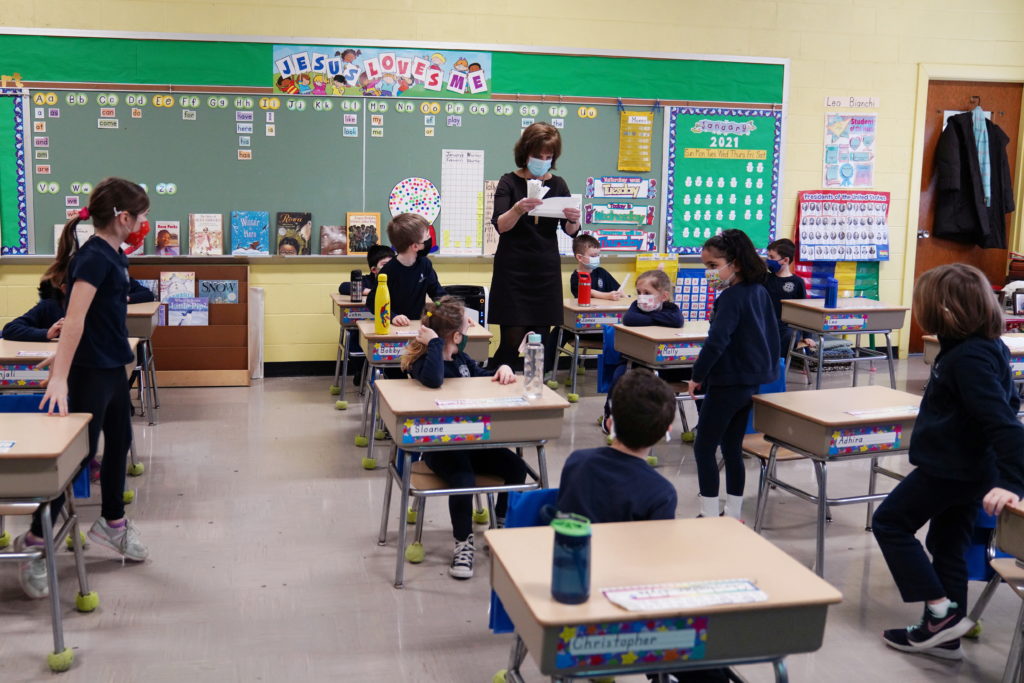Every spring, school and district leaders ask teachers about their plans to return to teaching in the fall. They need to know how many teachers to begin recruiting for the next school year.
These career conversations are currently taking place under the unprecedented circumstances brought on by the COVID-19 pandemic. Stories from across the country show high levels of teacher stress and burnout from repeated and long-term disruptions to school routines.
School leaders are worried about whether they’ll have enough teachers to keep classrooms staffed. In a January 2022 poll of members of the country’s largest teacher union, the National Education Association, 55% of educators said the pandemic has made them more likely to leave the teaching profession earlier than they had planned. That’s nearly double the proportion of teachers who said that in July 2020.
Among Black and Hispanic teachers, the percentages of teachers saying they have accelerated their plans to leave teaching were even greater – 62% and 59%, respectively.
Despite these signals of increased turnover, the past two years have not experienced mass departures from the teaching profession.
In the past, teachers who were looking to leave didn’t depart immediately, so there’s some hope that the current crop of burned-out teachers won’t either. Our recent working paper explains why. We looked at national data from over 100,000 public school teachers from 2004 to 2012. Of the teachers who said they would leave the profession “as soon as possible,” 34% had left the field by the following school year, and 66% were still teaching. By contrast, of the teachers who said they planned to remain in teaching as long as possible, just 5% left the profession, and 95% kept teaching the following year.
Leaving isn’t immediate
Teachers’ feelings about departure can change throughout the year. The 2021-2022 school year helps to illustrate this ebb and flow in teachers’ career plans.
The high rates of teacher absences during the surge of the omicron variant added additional responsibilities on an already strained teacher workforce. A teacher in Memphis who eventually quit said she was assigned nearly 200 additional students beyond her normal teaching load when a colleague quit midyear. An elementary school teacher in Brooklyn worried that too many teachers were working in schools without adequate ventilation systems or rules to reduce the spread of the coronavirus.
A beginning teacher in Colorado reflected in one report: “I also might want to just do it for one more year, just to kind of be more stable financially. If you asked me if I’ll be in the classroom in two years, or three years, I say those odds are even lower.”
As omicron wanes, teachers’ urgent feelings to leave may ease.
Changing personal circumstances may also influence teachers’ decision to leave. Many teachers depend on employer-provided health insurance and would want to find a job with comparable benefits. A veteran Florida teacher who considered quitting explains: “I need my health insurance, especially as I’m recovering from COVID. And I need the paycheck.”
Some teachers are keeping their jobs while they figure out their next steps. For example, one North Carolina teacher says she is thinking about going back to school for a new degree outside of education.
Likelihood of departure
Based on our research, we think it unlikely that most teachers who say they plan to leave teaching as soon as possible will actually leave this school year.
However, if even one-third of teachers who say they’re leaving the profession do so, that would be significantly more than the 8% of teachers who leave in an average year.
Teachers are clearly sounding the alarm about stress, burnout, dissatisfaction with school and district leadership, and other working conditions – even if they do stay in their jobs.
This article was originally posted on Why most teachers who say they plan to leave the profession probably won’t do so anytime soon











More Stories
More West Virginia schools will participate in opioid abuse prevention program
Pennsylvania is increasingly underfunding special education, report finds
Memphis’ Kingsbury High School community steps up call for changes